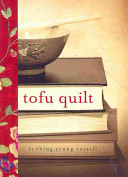by Carmen Martínez-Roldán, Columbia University

This week Dr. Denise Dávila from The University of Georgia shares her experience using Tofu Quilt by Ching Yeung Russell with preservice teachers.
Nominated for multiple awards and included on many notable book lists (ALA, IRA, NCTE) this Asian Pacific American Library Association Honor Book (2010) offers a stunning collection of poems. Together, the poems tell the story of Yeung Ying’s childhood and education
in Hong Kong in the 1960’s, a time when educating girls was not a priority for some members of Chinese society.
Here is the response of one of her pre-service teachers who focused on the content of the novel:
Tofu Quilt was an inspiring story of a young girl, Yeung, who excels as a poet in a time where females are discouraged to become writers. Her uncle encourages and supports her with the necessary funding for her to continue her poetry… Yeung’s mother also resists tradition and greatly encourages [Yeung] to live out her dream by sending her to a private school. Throughout the story, Yeung felt very significant when she would write letters to Uncle Five for Pau Pau. She felt accepted and needed, and that idea is very true for many of us. We all want to feel needed or to know that what we are doing is important to someone else…
Three of her other students focused on the poetry format:
I enjoyed reading a book in verse; I wasn’t sure at first if I would follow a story written this way. But as soon as I started reading I found it very simple and easy to understand. I would read another book in verse, as well as incorporate this into a classroom. I feel this style of book might be hard for younger children to understand, although there are many children who would enjoy the particular style. Yeung gives a vivid account of her life and determination.
Although I ordinarily struggle to maintain focus while reading poetry, the writing format and style of Tofu Quilt kept my interest for the entire story. The short poems that joined to form the full story gave me small, manageable reading goals and also made it easy for me to step away from the book when I needed to. I think a child would have a fun time reading this book for that exact reason- they would feel a sense of accomplishment each time they finished one poem and maybe would challenge themselves to read “just one more” before putting the book down for the evening.
Tofu Quilt has definitely made me rethink my aversion to poetry. It is easy to forget that there are many styles of poem and that disliking one does not mean you should write off the rest. I find Ching Yeung Russell to be interesting and well-spoken and I would enjoy reading another one of her stories. I actually plan to give my copy of Tofu Quilt to a middle school student who I know to be an avid reader. I’d like to hear the reaction of a younger reader. If I were to meet the author, I would like to ask her what inspired her to write for children and how she has been able to keep the memories of her childhood so fresh (or if she fills in the missing pieces with fiction).
Prof. Dávila’s students show us the potential of international literature to engage readers of all backgrounds. For this group of readers the poetry format of Tofu Quilt enabled them to discover or recover the love for poetry. Have you read this novel? We would like to hear about your experiences reading or using with your students this or other international novels.
Please visit wowlit.org to browse or search our growing database of books, to read one of our two on-line journals, or to learn more about our mission.
- Themes: Carmen M. Martínez-Roldán
- Descriptors: Student Connections, WOW Currents
